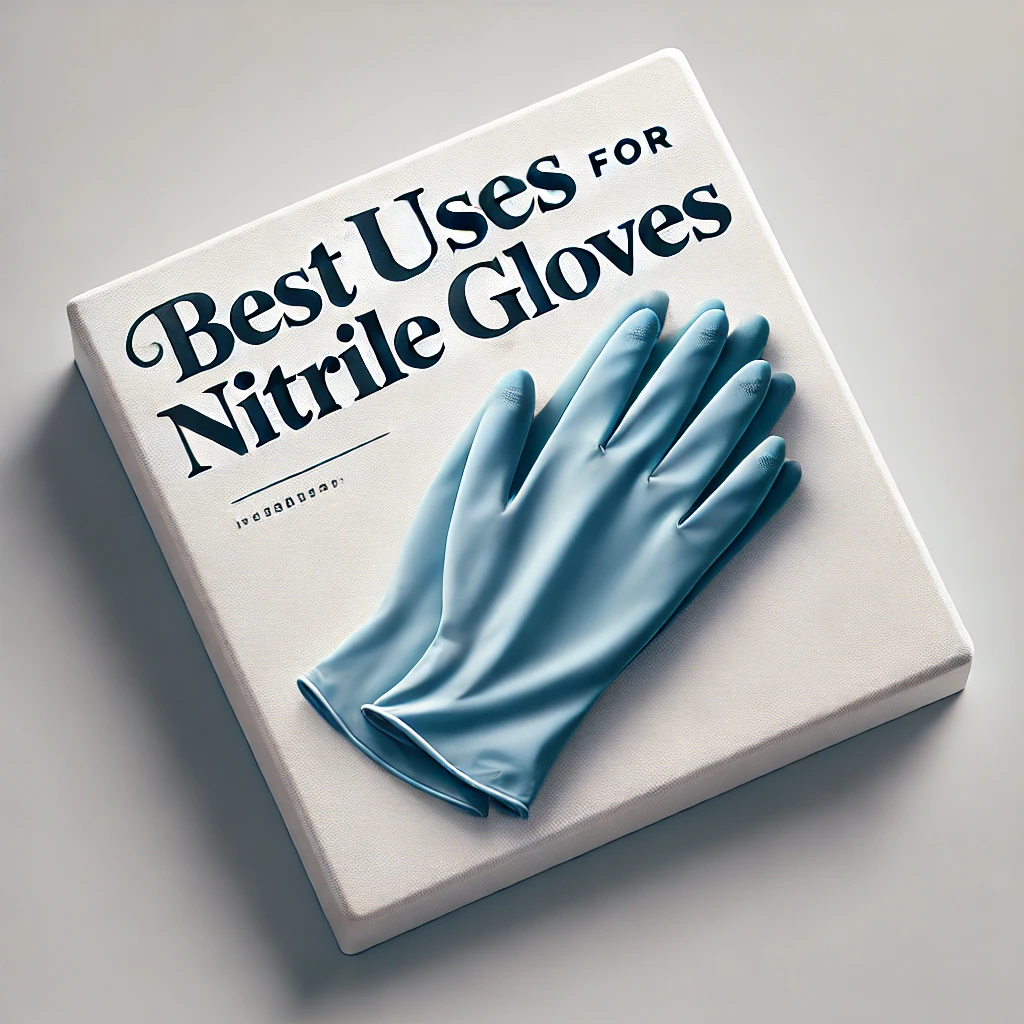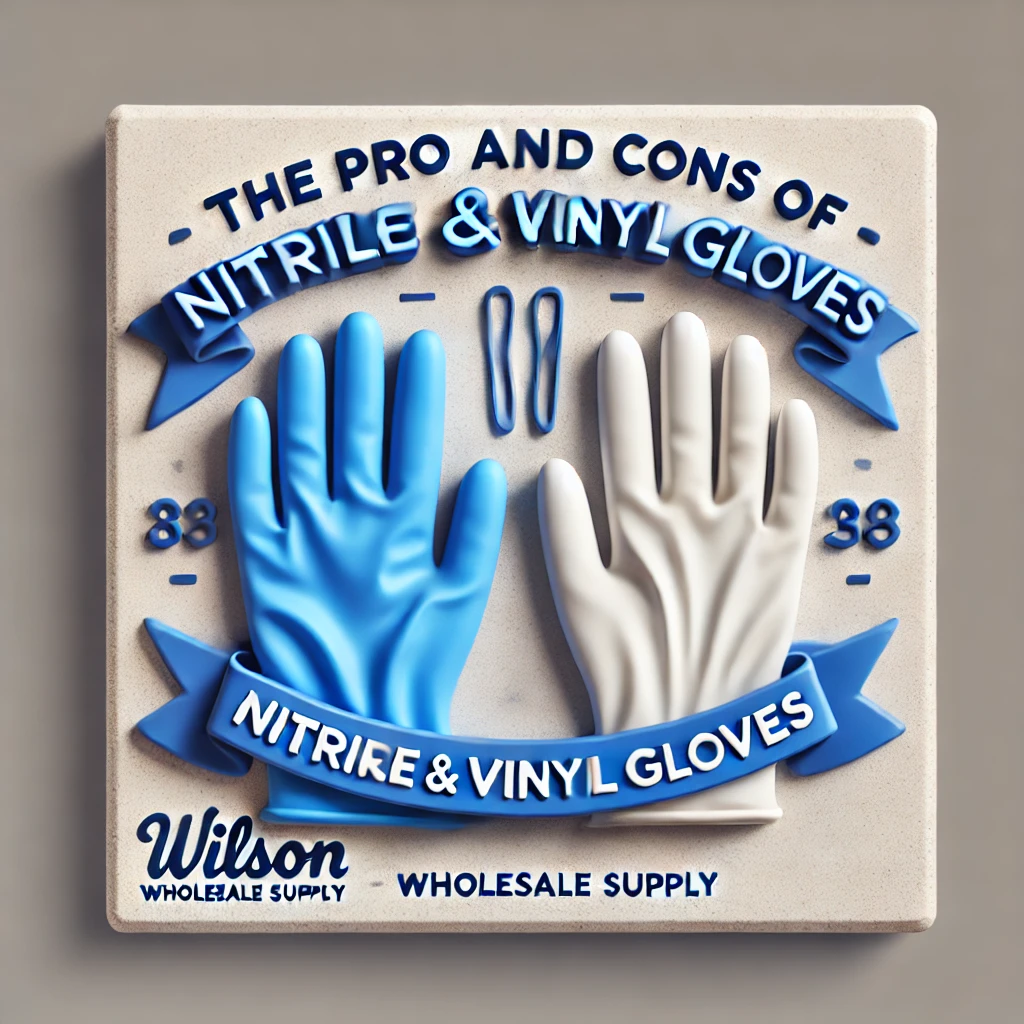Nitrile vs Vinyl Gloves – Comprehensive Comparison and Guide
The Pros and Cons of Nitrile and Vinyl Gloves
Introduction
Choosing the right type of disposable gloves is crucial, especially in fields like healthcare, food handling, and industrial work. Nitrile and vinyl gloves are two popular options, each with its own set of advantages and disadvantages. This guide dives deep into the differences between nitrile and vinyl gloves, their uses, and what makes them suitable for various tasks.
What are Nitrile Gloves?
Nitrile gloves are made from a synthetic rubber compound called nitrile butadiene rubber (NBR). They are a popular alternative to latex gloves due to their durability, chemical resistance, and allergy-free properties.
Key Features of Nitrile Gloves:
- Durability: Nitrile gloves are known for their puncture and tear resistance, making them suitable for medical and industrial use.
- Chemical Resistance: These gloves offer excellent protection against chemicals, oils, and solvents.
- Latex-Free: Nitrile gloves are ideal for individuals with latex allergies.
What are Vinyl Gloves?
Vinyl gloves are made from polyvinyl chloride (PVC) and are a cost-effective alternative to nitrile and latex gloves. They are commonly used in food preparation and handling, where high levels of durability and chemical resistance are not as critical.
Key Features of Vinyl Gloves:
- Affordability: Vinyl gloves are generally cheaper than nitrile gloves, making them a good option for low-risk tasks.
- Comfort: These gloves are soft and comfortable, but they lack the snug fit and flexibility of nitrile gloves.
- Latex-Free: Like nitrile gloves, vinyl gloves are also latex-free, catering to those with latex allergies.
Comparing Nitrile and Vinyl Gloves
Durability and Strength
Nitrile gloves outperform vinyl gloves in terms of durability and strength. They are less likely to tear and provide better protection against punctures and abrasions, making them ideal for medical and industrial applications.
Chemical Resistance
Nitrile gloves offer superior chemical resistance compared to vinyl gloves. They can handle exposure to a wider range of chemicals, oils, and solvents, making them suitable for tasks involving hazardous substances.
Comfort and Fit
While nitrile gloves provide a snug and comfortable fit, vinyl gloves are looser and can feel less restrictive. However, vinyl gloves do not conform to the hand as well as nitrile gloves, which can affect dexterity.
Cost
Vinyl gloves are generally more affordable than nitrile gloves, which makes them a cost-effective choice for tasks that do not require high durability or chemical resistance.
Allergies
Both nitrile and vinyl gloves are latex-free, making them suitable for individuals with latex allergies. However, nitrile gloves offer better overall protection and performance.

Best Uses for Nitrile Gloves
Nitrile gloves are versatile and can be used in various settings, including:
- Medical and Dental: Due to their high durability and chemical resistance, nitrile gloves are widely used in medical and dental fields to protect against bloodborne pathogens and other contaminants.
- Industrial: For handling chemicals, oils, and solvents, nitrile gloves provide excellent protection, making them a top choice in industrial environments.
- Laboratories: Providing robust protection against biohazards and chemicals, nitrile gloves are essential in laboratory settings.
- Automotive: Protecting hands from grease, oils, and other contaminants, nitrile gloves are ideal for automotive work.
Best Uses for Vinyl Gloves
Vinyl gloves are suitable for:
- Food Handling: Offering a cost-effective solution for food preparation tasks, vinyl gloves are commonly used in kitchens and catering services.
- Housekeeping: Providing a barrier against cleaning agents and household chemicals, vinyl gloves are useful for janitorial work.
- Low-Risk Medical Procedures: When high durability is not a primary concern, vinyl gloves can be used for basic medical tasks like examinations.
Environmental Impact
When it comes to environmental impact, both nitrile and vinyl gloves have their pros and cons.
Nitrile Gloves
Nitrile gloves are more durable, meaning they may be disposed of less frequently than vinyl gloves. However, they are made from synthetic rubber, which is not biodegradable. Some manufacturers are working on more eco-friendly versions, but these are not yet widely available.
Vinyl Gloves
Vinyl gloves are made from PVC, which is also not biodegradable and can release harmful chemicals when disposed of improperly. However, their lower cost means they are often used more frequently and disposed of in larger quantities.

Regulatory Standards
Understanding the regulatory standards for disposable gloves can help ensure you are using the right gloves for your needs.
Nitrile Gloves
Nitrile gloves often meet higher regulatory standards due to their use in medical and industrial settings. They may be certified for use in handling hazardous materials and provide protection against biohazards.
Vinyl Gloves
Vinyl gloves may not always meet the same stringent standards as nitrile gloves. However, they are still regulated and must meet certain safety and health standards for use in food handling and low-risk medical procedures.
Common Misconceptions
Misconception 1: Nitrile Gloves are Always Expensive While nitrile gloves can be more costly than vinyl, their durability and protection often justify the price. Bulk purchasing can also reduce costs.
Misconception 2: Vinyl Gloves are Inferior Vinyl gloves are not necessarily inferior; they simply serve different purposes. They are excellent for low-risk tasks and are more affordable, making them a practical choice for many applications.
Maintenance and Storage Tips
Proper maintenance and storage of disposable gloves can extend their usability and ensure they remain effective.
Nitrile Gloves
- Storage: Store in a cool, dry place away from direct sunlight to prevent degradation.
- Handling: Avoid stretching or pulling too hard when putting on or removing gloves to prevent tearing.
Vinyl Gloves
- Storage: Similar to nitrile gloves, store vinyl gloves in a cool, dry place away from direct sunlight.
- Handling: Vinyl gloves are more prone to tearing, so handle them gently.
Conclusion
Choosing the right type of disposable gloves can make a significant difference in safety and efficiency. Nitrile gloves offer superior durability, chemical resistance, and protection, making them ideal for high-risk tasks in medical, industrial, and laboratory settings. On the other hand, vinyl gloves are a more economical choice for low-risk tasks such as food handling and housekeeping.
By understanding the key differences between nitrile and vinyl gloves, you can make an informed decision that best suits your needs. Remember to consider the specific requirements of your tasks, any potential allergies, and your budget when making your choice.
Wilson Wholesale Supply offers FREE Local Deliveries in the Fraser Valley!!!

Nitrile vs Vinyl Gloves – Comprehensive Comparison and Guide 🚚 FREE Local Delivery in the Fraser Valley! 🚚
| Feature | Nitrile Gloves | Vinyl Gloves |
|---|---|---|
| Durability | High | Moderate |
| Chemical Resistance | High | Low |
| Comfort and Fit | Snug and comfortable | Looser fit |
| Cost | Higher | Lower |
| Latex-Free | Yes | Yes |
| Best Uses | Medical, Industrial, Laboratories | Food Handling, Housekeeping, Low-Risk Medical |
Links
Understanding Latex Allergies
Guide to Disposable Gloves
Nitrile vs Latex vs Vinyl Gloves: What’s the Difference?
People Aslo Ask
Q: Are nitrile gloves latex free?
A: Yes, nitrile gloves are latex-free, making them a suitable option for individuals with latex allergies.
Q: What are nitrile gloves?
A: Nitrile gloves are disposable gloves made from synthetic rubber, offering excellent resistance to chemicals, oils, and punctures.
Q: What are nitrile gloves used for?
A: Nitrile gloves are commonly used in medical settings, laboratories, food handling, and various industrial applications due to their durability and resistance to chemicals.
Q: What is nitrile made of?
A: Nitrile is made of a synthetic rubber compound called nitrile butadiene rubber (NBR), which is a combination of acrylonitrile and butadiene.
Q: What are the different types of gloves?
A: There are several types of gloves, including nitrile, latex, vinyl, and neoprene gloves, each with distinct properties and uses.
Q: What is the difference between vinyl and nitrile gloves?
A: Nitrile gloves are more durable, offer better protection against chemicals and punctures, and are suitable for people with latex allergies. Vinyl gloves are less expensive, provide basic protection, and are more suitable for low-risk tasks.
Q: Are nitrile gloves suitable for food handling?
A: Yes, nitrile gloves are safe for food handling as they are resistant to oils and fats, ensuring hygiene and safety in food preparation.
Q: How do nitrile gloves compare to latex gloves?
A: Nitrile gloves are more resistant to chemicals and punctures compared to latex gloves. Additionally, they are latex-free, making them an ideal choice for individuals with latex allergies.
Q: Can nitrile gloves be used for medical examinations?
A: Yes, nitrile gloves are widely used in medical examinations due to their high durability, puncture resistance, and protection against bloodborne pathogens.
Q: Are nitrile gloves biodegradable?
A: Nitrile gloves are not as biodegradable as latex gloves, but there are newer, eco-friendly nitrile options that are designed to decompose faster in landfill conditions.



0 Comments